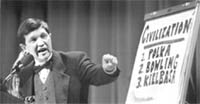Democratic
Presidential
Contender
Endorses
Medical
Marijuana
--
Ohio's
Kucinich
First
Out
of
the
Gate
5/30/03
Rep. Dennis Kucinich (D-OH) made history this week by becoming the first serious Democratic presidential candidate to endorse medical marijuana. In remarks to the San Francisco Chronicle on Wednesday, Kucinich said that if elected president he would sign an executive order allowing the use of marijuana for medical reasons. Medical marijuana should be available "to any patient who needs it to alleviate pain and suffering," regardless of the current federal drug laws, Kucinich told the Chronicle. "We must have health-care systems which are compassionate... so I support it without reservation." Kucinich's stand is in stark contrast with the position of the Bush administration, which has repeatedly sent the Drug Enforcement Administration (DEA) to raid, arrest and imprison medical marijuana patients and providers in states that have legalized the practice and which derides medical marijuana as a charade. It also sets him apart from the other seven declared Democratic presidential contenders, most of whom have had absolutely nothing to say about medical marijuana and one of whom -- former Vermont Gov. Howard Dean -- effectively blocked a medical marijuana bill in his state.
The Ohio Democrat's forthright position on medical marijuana contrasted vividly with the fence-straddling of another Democratic presidential contender visiting San Francisco this week, North Carolina Senator John Edwards. Pressed by reporters after a speech in which he failed to mention the topic, he called for further study. "I wouldn't change the (marijuana) law now, but I would set up a committee to see if pain relief is different with marijuana," Edwards said. In the meantime, he told reporters, medical marijuana users and providers should expect arrests. "It's the job of the Justice Department to enforce the law as it presently exists," said Edwards. By stepping out front on the medical marijuana issue, Kucinich, who has positioned himself as a strongly anti-war and pro-social justice candidate, is embracing a position endorsed by most voters. In recent years, a number of polls have shown increasing support for medical marijuana, including a CNN/Time poll last October showing that 80% of Americans believe medical marijuana should be legally available. And voters or legislators in Alaska, Arizona, California, Colorado, Hawaii, Maine, Maryland, Nevada, Oregon and Washington have already approved medical marijuana measures. The comments from the former Cleveland mayor drew praise from marijuana reform organizations -- which should come as little surprise because one of them helped push Kucinich to speak out and even helped draft his position statement on the issue. "We approached Kucinich at a fundraiser in LA after Ed Asner introduced Steph to the crowd," said Americans for Safe Access (http://www.safeaccessnow.org) spokeswoman Hilary McQuie, referring to fellow ASA agitator Stephanie Sherer. "He told us he was in favor of medical marijuana, so we pushed him to make a statement," she told DRCNet. "We ended up helping draft his position on the issue." "Dennis Kucinich has come a long way since 1998, when he voted for a congressional resolution condemning state medical marijuana laws, and we expect many other Democratic contenders to follow suit," said Robert Kampia, executive director of the Washington-based Marijuana Policy Project, in a statement greeting the remarks. "This is a natural issue for the Democrats: The Bush administration is completely out of step with the public, which doesn't want to see sick people hauled off to jail for taking their medicine," Kampia said. "Hats off to Kucinich," said Dale Gieringer, director of California NORML (http://www.canorml.org). "I hope the other candidates will follow his lead. The Democratic candidates have a lot to gain by favoring medical marijuana in California. Whichever candidate articulates the best policy is going to get our support, which could be as high as six percent of the Democratic primary electorate, and that could well make the difference in a tight race," he told DRCNet. Kucinich's stand on medical marijuana may already have had an impact on Dean, who has begun altering his tune and his tone as he campaigns on the West Coast. In a Thursday interview with San Francisco radio station KQED, Dean said he would ask the Food and Drug Administration to look into the issue and make a decision based on its findings. "I wouldn't crusade against it like Ashcroft," he said, "but I wouldn't legalize it." That's not enough for medical marijuana advocates. "Dean's dog won't hunt," said Gieringer. "He may be liberal on most issues, he may do well with the gay community, but when it comes to marijuana as medicine, he's part of the old school, he wants to let the narcocracy decide." "Dean isn't showing any signs of real progress here," scoffed ASA's McQuie. "If he thinks the FDA has any power on this issue, he's hopelessly uninformed and naïve." But for people concerned with ending the war on drugs, medical marijuana is just one issue, and quite likely the easiest for progressive politicians to embrace. Meanwhile, with a million and a half drug arrests each year and almost a half-million drug offenders rotting in prisons, with drug war totalitarianism reaching ever more deeply into the private lives of American citizens and being exported around the world, with the US police state growing ever stronger as the war on drugs merges with the war on terrorism, drug policy questions are more crucial than ever. In coming weeks, DRCNet will look at the Democratic presidential candidates' respective stands on drug policy issues, as well as examining the role of the drug reform movement in the forthcoming Democratic presidential sweepstakes. Visit http://www.kucinich.us/issues/issue_drugwar.htm ro read more about Dennis Kucinich's drug policy positions.
|

